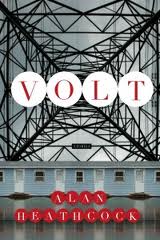|

Volt
Alan Heathcock
Graywolf Press
2011
$15.00
208 pp.
The eight stories in Alan Heathcock’s debut collection, Volt, are Biblical in scope and vision, both literally, as with the town-ravishing flood in “Peacekeeper,” and figuratively, such as with “Smoke,” in which a young man helps his father cover up a murder, a story that was not in the Old Testament but might as well have been—a hard trek through the woods, a harrowing climb up the mountains, a makeshift pyre in a cave. There is violence in these stories, violence blooming with retribution, but the violence is Volt’s dense bloodstream, whereas its heart is morality, that old-fashioned, untimely idea that there is a right way to live and a wrong way.
Each of Volt’s eight stories is set in or around an unspecific American Midwestern farming town named Krafton, and Krafton here becomes the key to that morality that pumps the blood through these stories. This is a small town. The people here know each other. Krafton is also a once-and-long-while lawless town, in the literal sense, meaning there were no police, no sheriffs, no peacekeepers, and this history of wild west-type lawlessness, while not necessarily the direct cause of the violence that occurs in Volt, has established a precedent that the people of Krafton have had to have made a choice about what governs them: the words of God, or else their own scruples. Their decisions provide an interesting paradox, then, an interesting contrast, where the stories in which the violence is most present, most severe (e.g. “Smoke,” “The Staying Freight,” “Peacekeeper”), are the more morally sound stories, the stories in which their characters are physically and spiritually suffering from their wrongdoings, and where the violence is implied or delayed or barely glanced at (e.g. “Furlough,” “Fort Apache”), the characters are less sympathetic, less redeemed. It’s to Heathcock’s credit as a writer that he never treats any of these characters with less empathy than they deserve. He brings even the most despicable characters to life while being sensitive to their vulnerabilities, and that seems to speak to the small, webby nature of Krafton, where every Sunday is basically a family reunion at church, where everyone’s actions effect everyone else, where the lives of each person are known intimately by all others, where everyone’s lights are on and curtains open.
Structurally, Heathcock represents the nature of Krafton’s Midwestern intimacy by entwining characters in other characters’ stories, most notably Helen Farraley, the town’s first and only law officer, and Pastor Hamby, whose reoccurrences happen in startling, illuminating ways. The presence of these characters (and what better characters to have reoccur here than Law and Faith incarnate?) in multiple, overlapping stories could have given Volt a more novelistic feel, I suppose, if Heathcock had wanted to take the book in that direction, but instead he (thankfully and wisely) doesn’t try to craft a more “marketable” form out of these cursory connections. He gives each story the attention it deserves, and as a result the stories, individually, feel almost novelistic in scope, in moral intensity, and in the keen and generous precision with which he studies and crafts his characters and settings.
Volt is an incredible work of American fiction, and it’s distinctly American, not only in Heathcock’s unstoppable, measured, hard-fought voice, but mainly in how each of these characters believes in their individuality, are rich with individuality, and are yet still so undeniably connected, to the point that when they morally stumble, so do the rest, locked together at the ankles by chains.
--Michael Goroff
Michael Goroff is a contributing editor and small press fiction staff reviewer for Barn Owl Review. He lives with his cat in Akron, Ohio, where he is currently pursuing an MFA in Fiction through the Northeast Ohio Master of Fine Arts program.
Also by Michael Goroff:
Review of Look! Look! Feathers by Mike Young
Review of Us by Michael Kimball
Review of How They Were Found by Matt Bell
|
|

